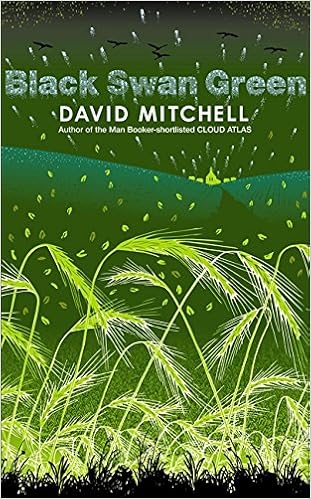birdstuffedtwigsnapped silence, toothy bracken, and places you can't find if you're not alone. Time in woods's older than time in clocks, and truer. Ghosts of Might Be run riot in woods, and stationery shops and messes of stars. [p. 234]This is a book about an adolescent boy growing up in the early 80s, who writes poetry, thinks Thatcher is great and the Falklands War will never be forgotten, and is so focussed on his own problems that he's oblivious to the momentous changes happening around him.
Why no, his name is not Adrian Mole. It is Jason Taylor, and Black Swan Green is considerably less humorous -- and more profound -- than The Secret Diary of Adrian Mole. Jason lives in the rural village of Black Swan Green, where there are, apparently, no swans at all. His parents and his elder sister are more or less mysterious to him: he has a better understanding of his friends and foes at school.
Superficially this is the story of the year when he breaks his grandfather's Omega Seamaster watch, and panics, and tries to raise the money to replace it before his parents find out. On a deeper level, it's about Jason growing up -- and growing as a poet, under the tuition of old Mrs Crommelynck (who curses the British with 'twenty years of Thatchers') -- and of the secrets he keeps, the secrets he tells, the secrets he doesn't even recognise. There is a great deal happening in the background which never really became clear, at least to me, but had a fantastical ambience: the old woman in a dark house by a frozen lake where many children have drowned; mysterious tunnels under the hills; of the part of the woods that 'just isn't good'; the secret society, Spooks, which may be more than it seems ...
There were a couple of things that rang false: would Jason have known about Goth culture in 1982? was there really such excitement about the end of the Falklands War? (Several friends say 'yes there was'; and it seems to have been the week I was doing my O levels and worrying about my mother having been admitted to hospital for surgery, so maybe it passed me by.)
I liked Jason a lot. He is a thoughtful character, prone to parentheses and moments of lyric clarity, and like many adolescents (especially the male ones) he's obsessed by and ignorant about sex. The main focus of his world, though, is bullying, and the way it expands to fill a child's world until everything else is pushed aside. Yet he doesn't lose sight of the principle that being good to other people matters: that it's more important than being right.
The supporting cast is good too, including the girls. And some of the characters appear in other novels by Mitchell: Hugo in The Bone Clocks, for example, and Eva van Crommelynck in Cloud Atlas.
"Wish I could be thirteen again." Then, I thought, you've obviously forgotten what it's like. [p. 169]

No comments:
Post a Comment